Foodora: Hospitality Business Toolkit Report and Analysis
VerifiedAdded on 2020/10/22
|14
|3853
|143
Report
AI Summary
This report examines a hospitality business toolkit, using Foodora as a case study. It covers financial performance management, including principles like risk assessment and tax planning, and illustrates the double-entry bookkeeping system. The report then delves into the HR life cycle, emphasizing employee retention through recruitment, training, motivation, evaluation, and celebration. It also presents a performance management plan for specific job roles, like a receptionist, with steps for planning, implementation, evaluation, and feedback. Furthermore, the report outlines key legislation that hospitality organizations must comply with, such as waste management and licensing laws. Finally, it explores the importance of communication and coordination within different departments of a hospitality business. The report provides a comprehensive overview of essential business practices within the hospitality industry.
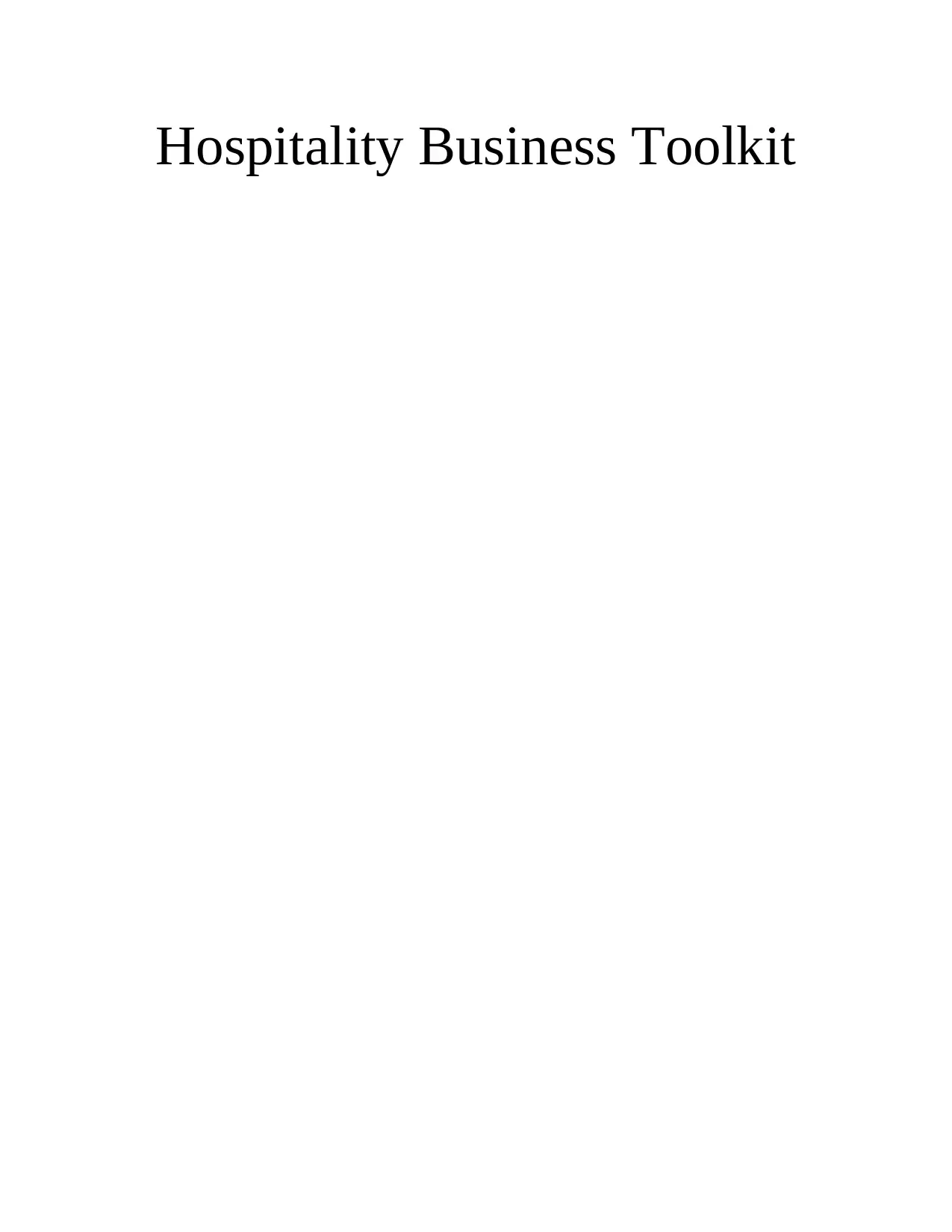
Hospitality Business Toolkit
Paraphrase This Document
Need a fresh take? Get an instant paraphrase of this document with our AI Paraphraser
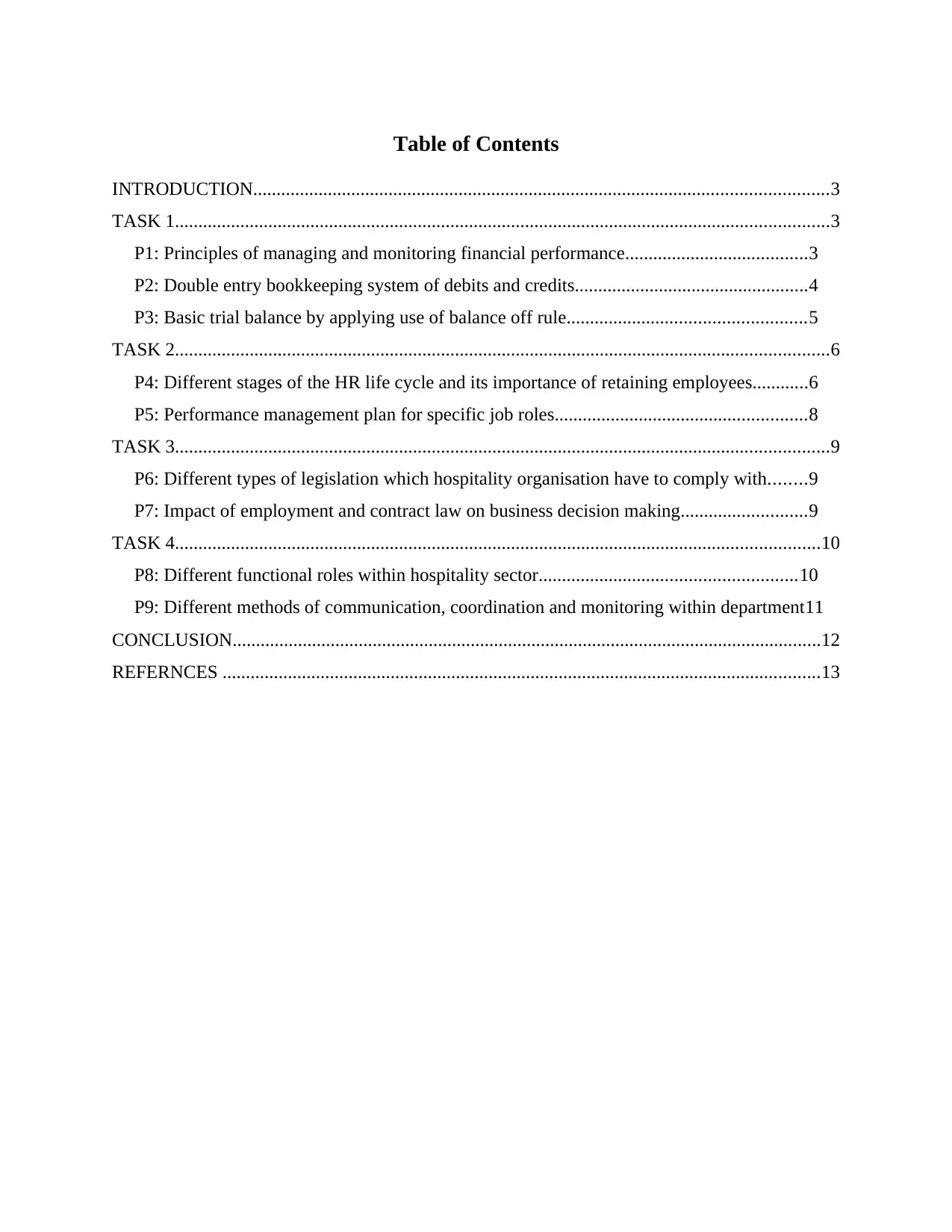
Table of Contents
INTRODUCTION...........................................................................................................................3
TASK 1............................................................................................................................................3
P1: Principles of managing and monitoring financial performance.......................................3
P2: Double entry bookkeeping system of debits and credits..................................................4
P3: Basic trial balance by applying use of balance off rule...................................................5
TASK 2............................................................................................................................................6
P4: Different stages of the HR life cycle and its importance of retaining employees............6
P5: Performance management plan for specific job roles......................................................8
TASK 3............................................................................................................................................9
P6: Different types of legislation which hospitality organisation have to comply with........9
P7: Impact of employment and contract law on business decision making...........................9
TASK 4..........................................................................................................................................10
P8: Different functional roles within hospitality sector.......................................................10
P9: Different methods of communication, coordination and monitoring within department11
CONCLUSION..............................................................................................................................12
REFERNCES ................................................................................................................................13
INTRODUCTION...........................................................................................................................3
TASK 1............................................................................................................................................3
P1: Principles of managing and monitoring financial performance.......................................3
P2: Double entry bookkeeping system of debits and credits..................................................4
P3: Basic trial balance by applying use of balance off rule...................................................5
TASK 2............................................................................................................................................6
P4: Different stages of the HR life cycle and its importance of retaining employees............6
P5: Performance management plan for specific job roles......................................................8
TASK 3............................................................................................................................................9
P6: Different types of legislation which hospitality organisation have to comply with........9
P7: Impact of employment and contract law on business decision making...........................9
TASK 4..........................................................................................................................................10
P8: Different functional roles within hospitality sector.......................................................10
P9: Different methods of communication, coordination and monitoring within department11
CONCLUSION..............................................................................................................................12
REFERNCES ................................................................................................................................13
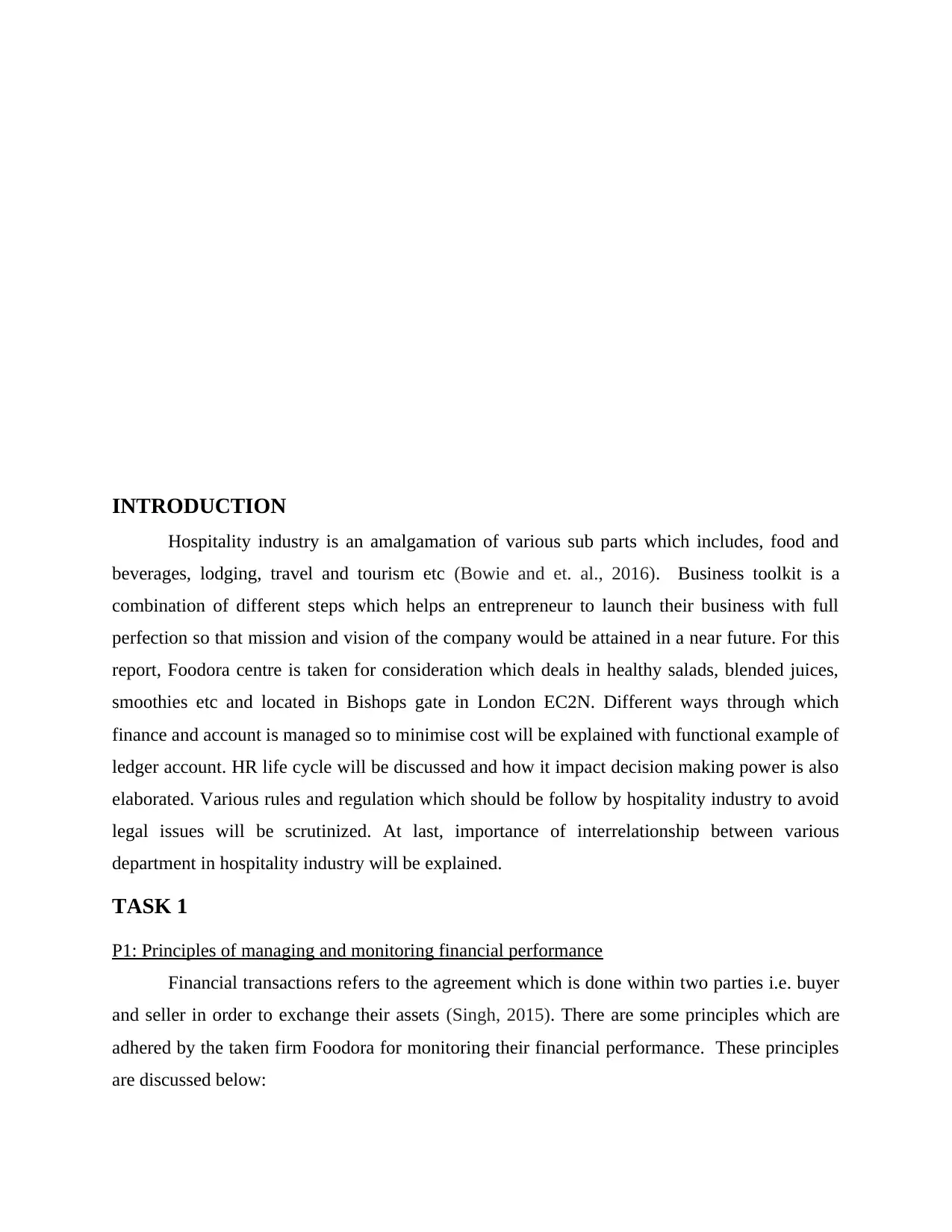
INTRODUCTION
Hospitality industry is an amalgamation of various sub parts which includes, food and
beverages, lodging, travel and tourism etc (Bowie and et. al., 2016). Business toolkit is a
combination of different steps which helps an entrepreneur to launch their business with full
perfection so that mission and vision of the company would be attained in a near future. For this
report, Foodora centre is taken for consideration which deals in healthy salads, blended juices,
smoothies etc and located in Bishops gate in London EC2N. Different ways through which
finance and account is managed so to minimise cost will be explained with functional example of
ledger account. HR life cycle will be discussed and how it impact decision making power is also
elaborated. Various rules and regulation which should be follow by hospitality industry to avoid
legal issues will be scrutinized. At last, importance of interrelationship between various
department in hospitality industry will be explained.
TASK 1
P1: Principles of managing and monitoring financial performance
Financial transactions refers to the agreement which is done within two parties i.e. buyer
and seller in order to exchange their assets (Singh, 2015). There are some principles which are
adhered by the taken firm Foodora for monitoring their financial performance. These principles
are discussed below:
Hospitality industry is an amalgamation of various sub parts which includes, food and
beverages, lodging, travel and tourism etc (Bowie and et. al., 2016). Business toolkit is a
combination of different steps which helps an entrepreneur to launch their business with full
perfection so that mission and vision of the company would be attained in a near future. For this
report, Foodora centre is taken for consideration which deals in healthy salads, blended juices,
smoothies etc and located in Bishops gate in London EC2N. Different ways through which
finance and account is managed so to minimise cost will be explained with functional example of
ledger account. HR life cycle will be discussed and how it impact decision making power is also
elaborated. Various rules and regulation which should be follow by hospitality industry to avoid
legal issues will be scrutinized. At last, importance of interrelationship between various
department in hospitality industry will be explained.
TASK 1
P1: Principles of managing and monitoring financial performance
Financial transactions refers to the agreement which is done within two parties i.e. buyer
and seller in order to exchange their assets (Singh, 2015). There are some principles which are
adhered by the taken firm Foodora for monitoring their financial performance. These principles
are discussed below:
⊘ This is a preview!⊘
Do you want full access?
Subscribe today to unlock all pages.

Trusted by 1+ million students worldwide
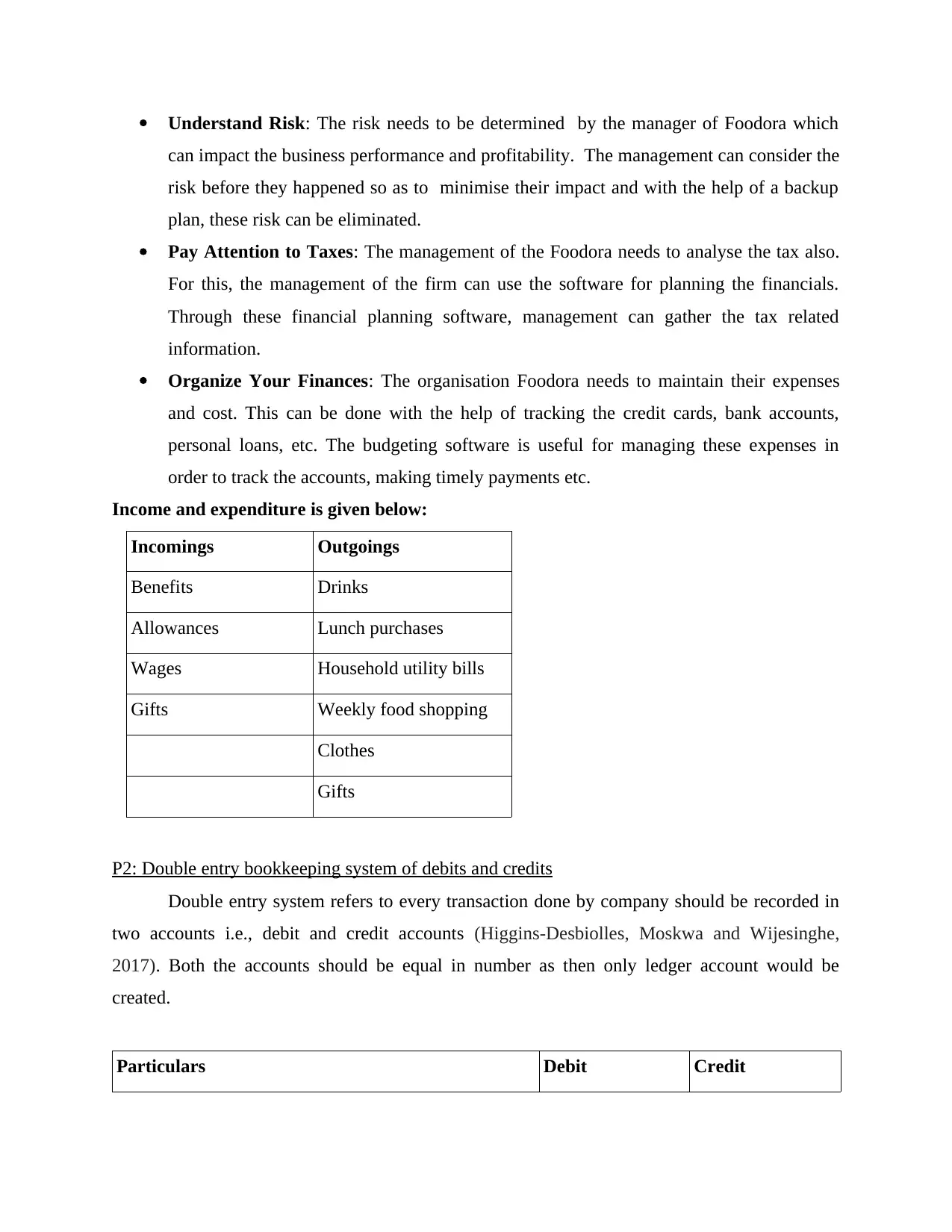
Understand Risk: The risk needs to be determined by the manager of Foodora which
can impact the business performance and profitability. The management can consider the
risk before they happened so as to minimise their impact and with the help of a backup
plan, these risk can be eliminated.
Pay Attention to Taxes: The management of the Foodora needs to analyse the tax also.
For this, the management of the firm can use the software for planning the financials.
Through these financial planning software, management can gather the tax related
information.
Organize Your Finances: The organisation Foodora needs to maintain their expenses
and cost. This can be done with the help of tracking the credit cards, bank accounts,
personal loans, etc. The budgeting software is useful for managing these expenses in
order to track the accounts, making timely payments etc.
Income and expenditure is given below:
Incomings Outgoings
Benefits Drinks
Allowances Lunch purchases
Wages Household utility bills
Gifts Weekly food shopping
Clothes
Gifts
P2: Double entry bookkeeping system of debits and credits
Double entry system refers to every transaction done by company should be recorded in
two accounts i.e., debit and credit accounts (Higgins-Desbiolles, Moskwa and Wijesinghe,
2017). Both the accounts should be equal in number as then only ledger account would be
created.
Particulars Debit Credit
can impact the business performance and profitability. The management can consider the
risk before they happened so as to minimise their impact and with the help of a backup
plan, these risk can be eliminated.
Pay Attention to Taxes: The management of the Foodora needs to analyse the tax also.
For this, the management of the firm can use the software for planning the financials.
Through these financial planning software, management can gather the tax related
information.
Organize Your Finances: The organisation Foodora needs to maintain their expenses
and cost. This can be done with the help of tracking the credit cards, bank accounts,
personal loans, etc. The budgeting software is useful for managing these expenses in
order to track the accounts, making timely payments etc.
Income and expenditure is given below:
Incomings Outgoings
Benefits Drinks
Allowances Lunch purchases
Wages Household utility bills
Gifts Weekly food shopping
Clothes
Gifts
P2: Double entry bookkeeping system of debits and credits
Double entry system refers to every transaction done by company should be recorded in
two accounts i.e., debit and credit accounts (Higgins-Desbiolles, Moskwa and Wijesinghe,
2017). Both the accounts should be equal in number as then only ledger account would be
created.
Particulars Debit Credit
Paraphrase This Document
Need a fresh take? Get an instant paraphrase of this document with our AI Paraphraser
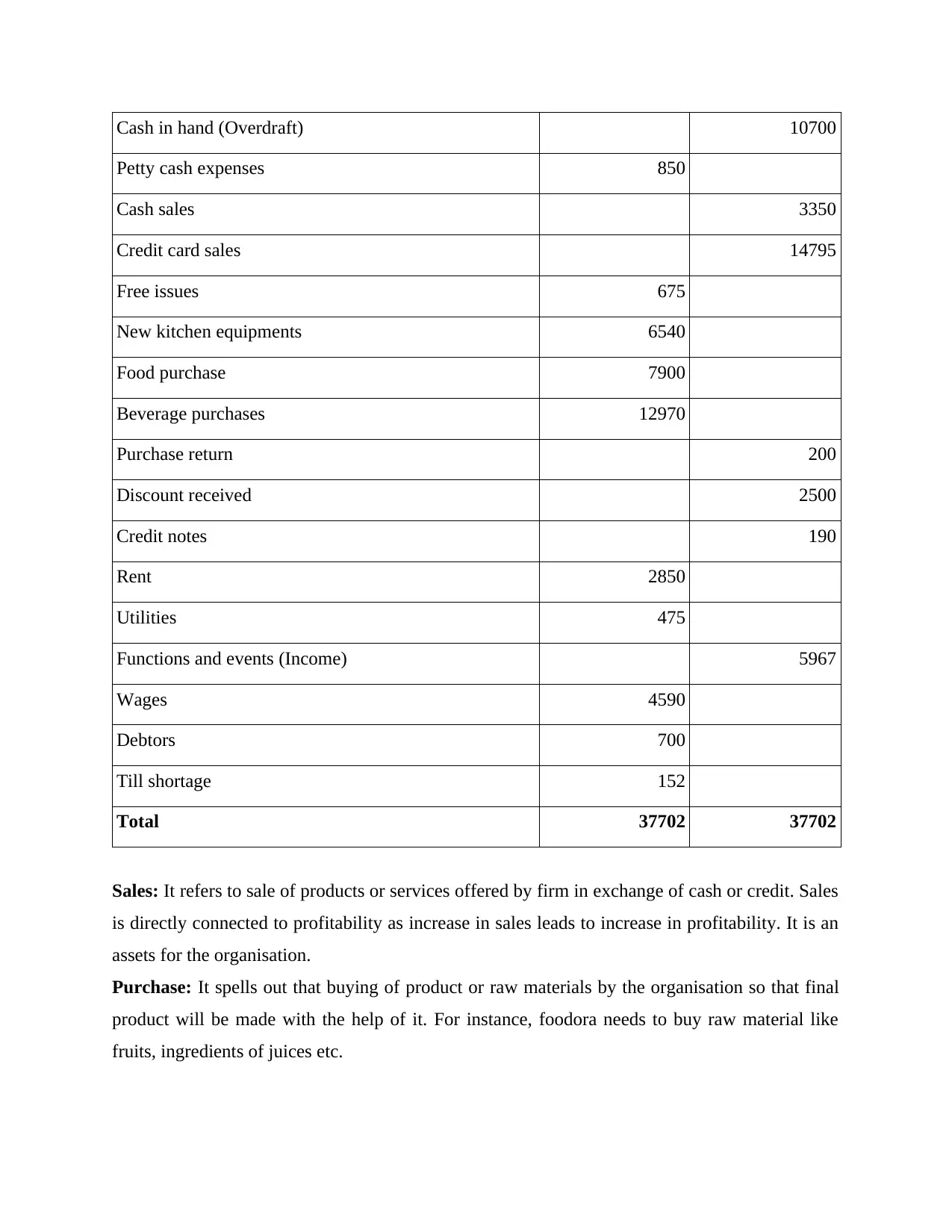
Cash in hand (Overdraft) 10700
Petty cash expenses 850
Cash sales 3350
Credit card sales 14795
Free issues 675
New kitchen equipments 6540
Food purchase 7900
Beverage purchases 12970
Purchase return 200
Discount received 2500
Credit notes 190
Rent 2850
Utilities 475
Functions and events (Income) 5967
Wages 4590
Debtors 700
Till shortage 152
Total 37702 37702
Sales: It refers to sale of products or services offered by firm in exchange of cash or credit. Sales
is directly connected to profitability as increase in sales leads to increase in profitability. It is an
assets for the organisation.
Purchase: It spells out that buying of product or raw materials by the organisation so that final
product will be made with the help of it. For instance, foodora needs to buy raw material like
fruits, ingredients of juices etc.
Petty cash expenses 850
Cash sales 3350
Credit card sales 14795
Free issues 675
New kitchen equipments 6540
Food purchase 7900
Beverage purchases 12970
Purchase return 200
Discount received 2500
Credit notes 190
Rent 2850
Utilities 475
Functions and events (Income) 5967
Wages 4590
Debtors 700
Till shortage 152
Total 37702 37702
Sales: It refers to sale of products or services offered by firm in exchange of cash or credit. Sales
is directly connected to profitability as increase in sales leads to increase in profitability. It is an
assets for the organisation.
Purchase: It spells out that buying of product or raw materials by the organisation so that final
product will be made with the help of it. For instance, foodora needs to buy raw material like
fruits, ingredients of juices etc.
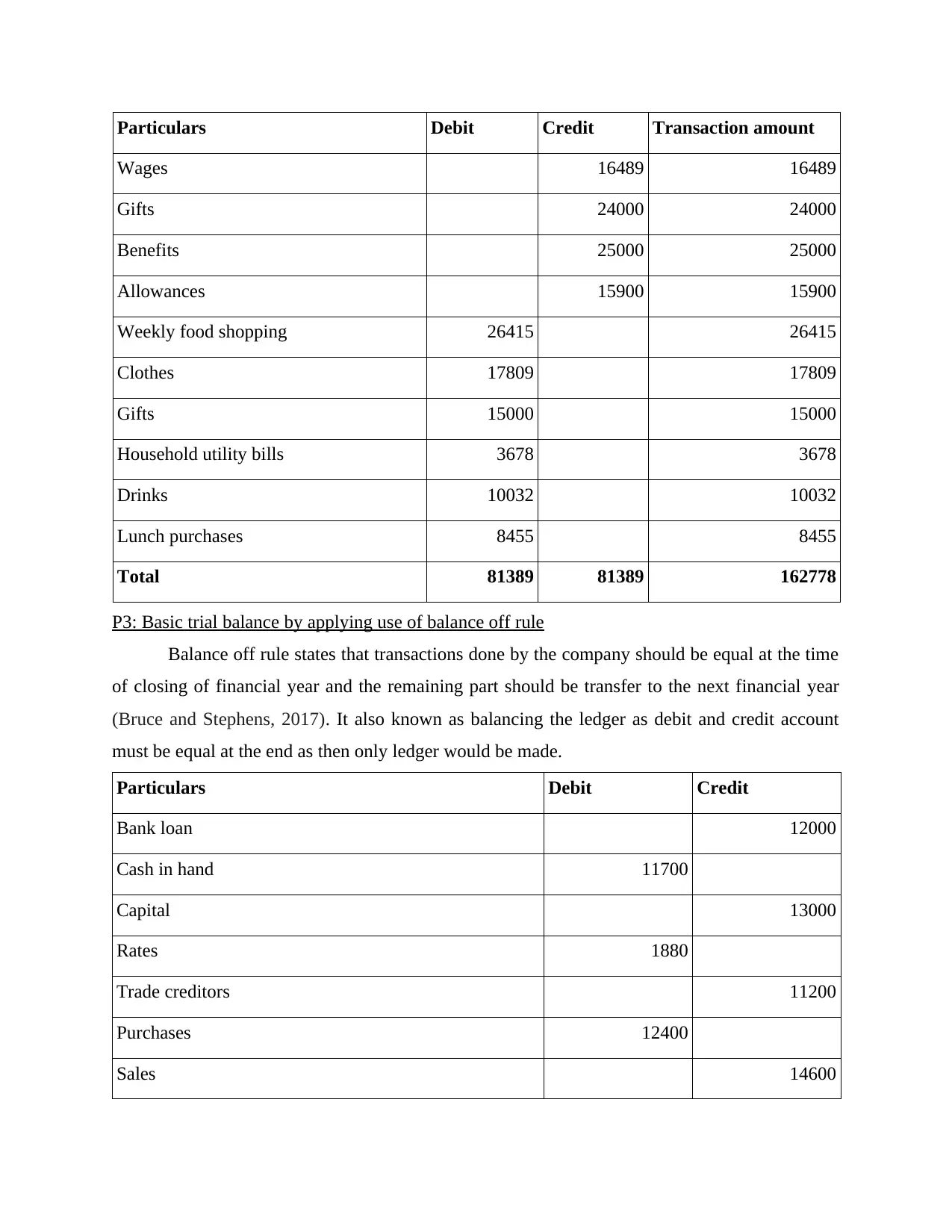
Particulars Debit Credit Transaction amount
Wages 16489 16489
Gifts 24000 24000
Benefits 25000 25000
Allowances 15900 15900
Weekly food shopping 26415 26415
Clothes 17809 17809
Gifts 15000 15000
Household utility bills 3678 3678
Drinks 10032 10032
Lunch purchases 8455 8455
Total 81389 81389 162778
P3: Basic trial balance by applying use of balance off rule
Balance off rule states that transactions done by the company should be equal at the time
of closing of financial year and the remaining part should be transfer to the next financial year
(Bruce and Stephens, 2017). It also known as balancing the ledger as debit and credit account
must be equal at the end as then only ledger would be made.
Particulars Debit Credit
Bank loan 12000
Cash in hand 11700
Capital 13000
Rates 1880
Trade creditors 11200
Purchases 12400
Sales 14600
Wages 16489 16489
Gifts 24000 24000
Benefits 25000 25000
Allowances 15900 15900
Weekly food shopping 26415 26415
Clothes 17809 17809
Gifts 15000 15000
Household utility bills 3678 3678
Drinks 10032 10032
Lunch purchases 8455 8455
Total 81389 81389 162778
P3: Basic trial balance by applying use of balance off rule
Balance off rule states that transactions done by the company should be equal at the time
of closing of financial year and the remaining part should be transfer to the next financial year
(Bruce and Stephens, 2017). It also known as balancing the ledger as debit and credit account
must be equal at the end as then only ledger would be made.
Particulars Debit Credit
Bank loan 12000
Cash in hand 11700
Capital 13000
Rates 1880
Trade creditors 11200
Purchases 12400
Sales 14600
⊘ This is a preview!⊘
Do you want full access?
Subscribe today to unlock all pages.

Trusted by 1+ million students worldwide
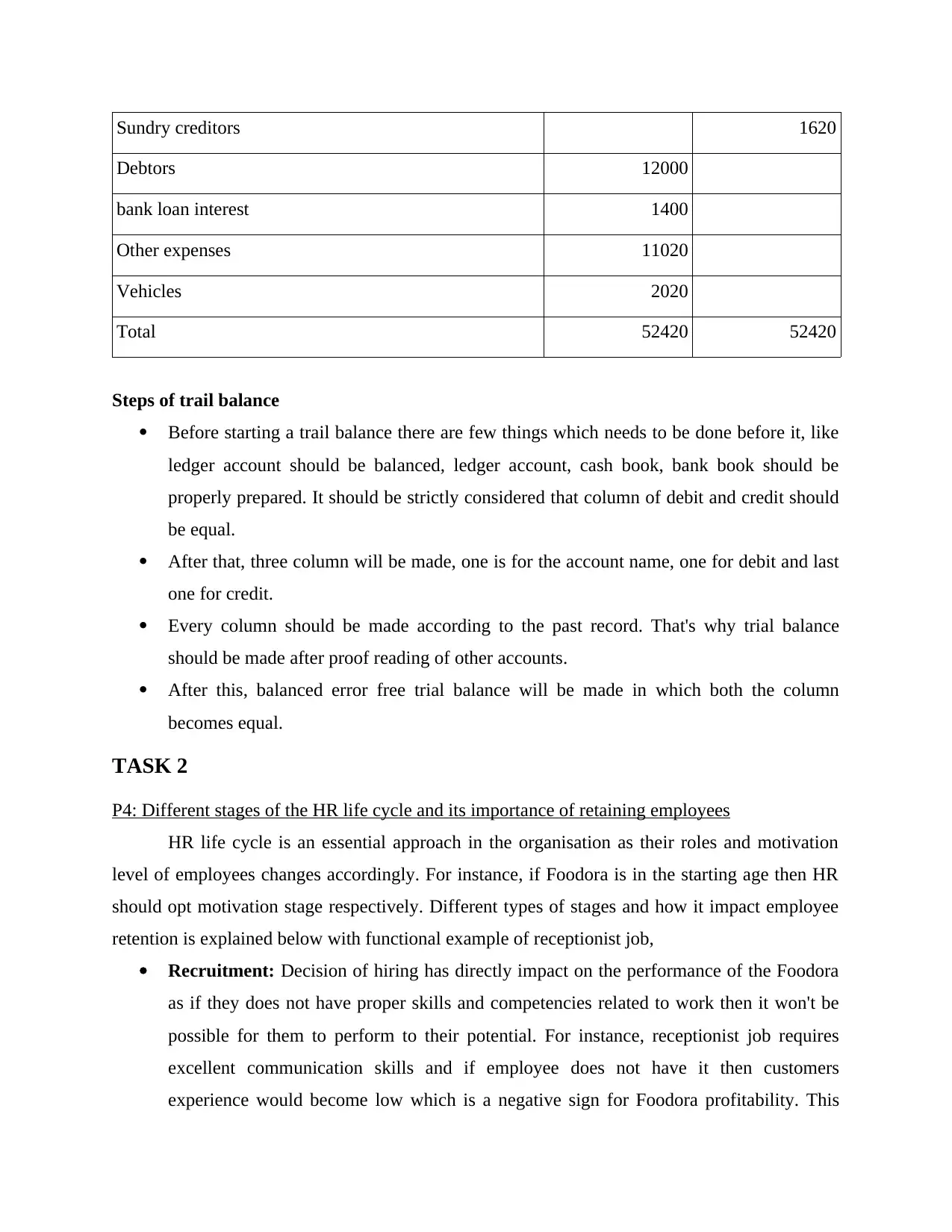
Sundry creditors 1620
Debtors 12000
bank loan interest 1400
Other expenses 11020
Vehicles 2020
Total 52420 52420
Steps of trail balance
Before starting a trail balance there are few things which needs to be done before it, like
ledger account should be balanced, ledger account, cash book, bank book should be
properly prepared. It should be strictly considered that column of debit and credit should
be equal.
After that, three column will be made, one is for the account name, one for debit and last
one for credit.
Every column should be made according to the past record. That's why trial balance
should be made after proof reading of other accounts.
After this, balanced error free trial balance will be made in which both the column
becomes equal.
TASK 2
P4: Different stages of the HR life cycle and its importance of retaining employees
HR life cycle is an essential approach in the organisation as their roles and motivation
level of employees changes accordingly. For instance, if Foodora is in the starting age then HR
should opt motivation stage respectively. Different types of stages and how it impact employee
retention is explained below with functional example of receptionist job,
Recruitment: Decision of hiring has directly impact on the performance of the Foodora
as if they does not have proper skills and competencies related to work then it won't be
possible for them to perform to their potential. For instance, receptionist job requires
excellent communication skills and if employee does not have it then customers
experience would become low which is a negative sign for Foodora profitability. This
Debtors 12000
bank loan interest 1400
Other expenses 11020
Vehicles 2020
Total 52420 52420
Steps of trail balance
Before starting a trail balance there are few things which needs to be done before it, like
ledger account should be balanced, ledger account, cash book, bank book should be
properly prepared. It should be strictly considered that column of debit and credit should
be equal.
After that, three column will be made, one is for the account name, one for debit and last
one for credit.
Every column should be made according to the past record. That's why trial balance
should be made after proof reading of other accounts.
After this, balanced error free trial balance will be made in which both the column
becomes equal.
TASK 2
P4: Different stages of the HR life cycle and its importance of retaining employees
HR life cycle is an essential approach in the organisation as their roles and motivation
level of employees changes accordingly. For instance, if Foodora is in the starting age then HR
should opt motivation stage respectively. Different types of stages and how it impact employee
retention is explained below with functional example of receptionist job,
Recruitment: Decision of hiring has directly impact on the performance of the Foodora
as if they does not have proper skills and competencies related to work then it won't be
possible for them to perform to their potential. For instance, receptionist job requires
excellent communication skills and if employee does not have it then customers
experience would become low which is a negative sign for Foodora profitability. This
Paraphrase This Document
Need a fresh take? Get an instant paraphrase of this document with our AI Paraphraser
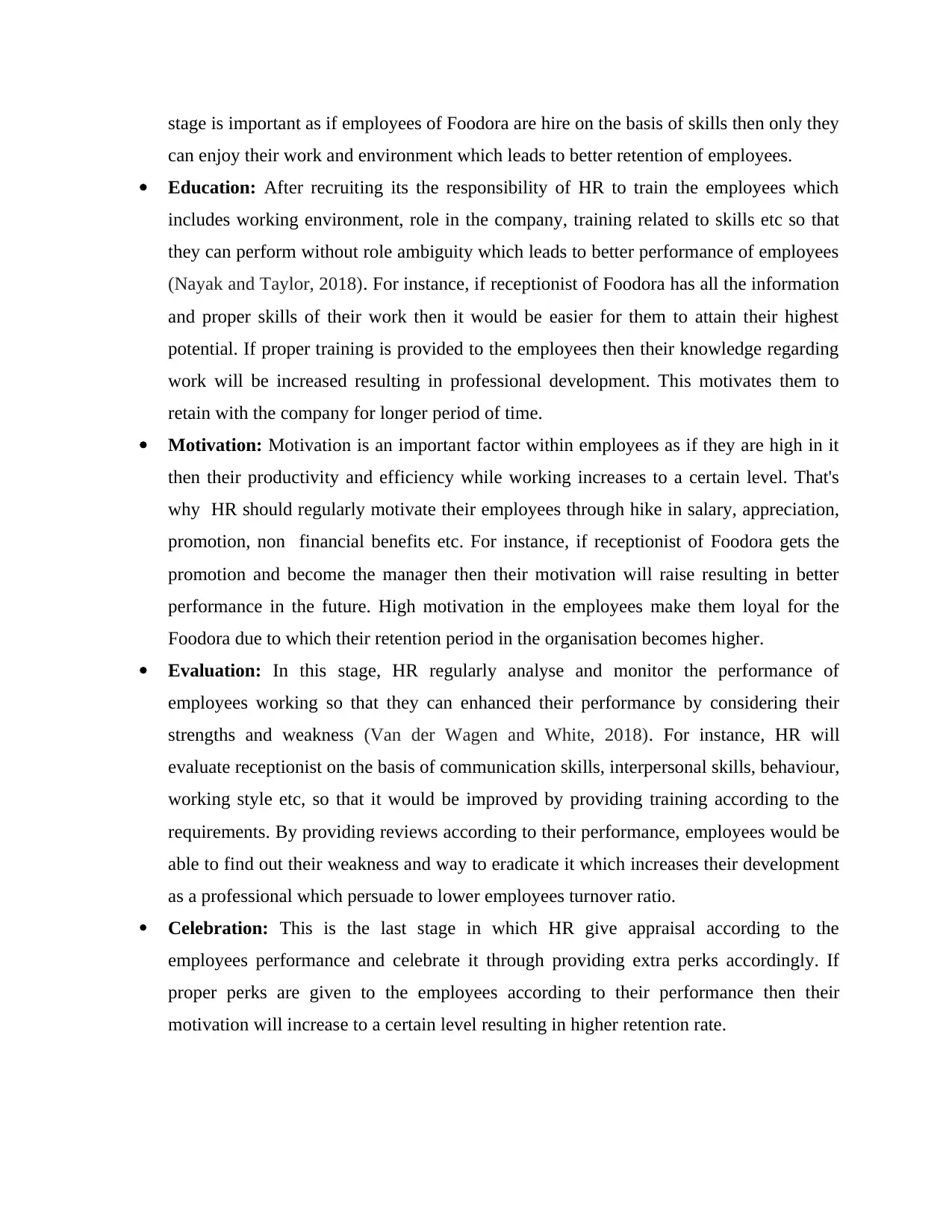
stage is important as if employees of Foodora are hire on the basis of skills then only they
can enjoy their work and environment which leads to better retention of employees.
Education: After recruiting its the responsibility of HR to train the employees which
includes working environment, role in the company, training related to skills etc so that
they can perform without role ambiguity which leads to better performance of employees
(Nayak and Taylor, 2018). For instance, if receptionist of Foodora has all the information
and proper skills of their work then it would be easier for them to attain their highest
potential. If proper training is provided to the employees then their knowledge regarding
work will be increased resulting in professional development. This motivates them to
retain with the company for longer period of time.
Motivation: Motivation is an important factor within employees as if they are high in it
then their productivity and efficiency while working increases to a certain level. That's
why HR should regularly motivate their employees through hike in salary, appreciation,
promotion, non financial benefits etc. For instance, if receptionist of Foodora gets the
promotion and become the manager then their motivation will raise resulting in better
performance in the future. High motivation in the employees make them loyal for the
Foodora due to which their retention period in the organisation becomes higher.
Evaluation: In this stage, HR regularly analyse and monitor the performance of
employees working so that they can enhanced their performance by considering their
strengths and weakness (Van der Wagen and White, 2018). For instance, HR will
evaluate receptionist on the basis of communication skills, interpersonal skills, behaviour,
working style etc, so that it would be improved by providing training according to the
requirements. By providing reviews according to their performance, employees would be
able to find out their weakness and way to eradicate it which increases their development
as a professional which persuade to lower employees turnover ratio.
Celebration: This is the last stage in which HR give appraisal according to the
employees performance and celebrate it through providing extra perks accordingly. If
proper perks are given to the employees according to their performance then their
motivation will increase to a certain level resulting in higher retention rate.
can enjoy their work and environment which leads to better retention of employees.
Education: After recruiting its the responsibility of HR to train the employees which
includes working environment, role in the company, training related to skills etc so that
they can perform without role ambiguity which leads to better performance of employees
(Nayak and Taylor, 2018). For instance, if receptionist of Foodora has all the information
and proper skills of their work then it would be easier for them to attain their highest
potential. If proper training is provided to the employees then their knowledge regarding
work will be increased resulting in professional development. This motivates them to
retain with the company for longer period of time.
Motivation: Motivation is an important factor within employees as if they are high in it
then their productivity and efficiency while working increases to a certain level. That's
why HR should regularly motivate their employees through hike in salary, appreciation,
promotion, non financial benefits etc. For instance, if receptionist of Foodora gets the
promotion and become the manager then their motivation will raise resulting in better
performance in the future. High motivation in the employees make them loyal for the
Foodora due to which their retention period in the organisation becomes higher.
Evaluation: In this stage, HR regularly analyse and monitor the performance of
employees working so that they can enhanced their performance by considering their
strengths and weakness (Van der Wagen and White, 2018). For instance, HR will
evaluate receptionist on the basis of communication skills, interpersonal skills, behaviour,
working style etc, so that it would be improved by providing training according to the
requirements. By providing reviews according to their performance, employees would be
able to find out their weakness and way to eradicate it which increases their development
as a professional which persuade to lower employees turnover ratio.
Celebration: This is the last stage in which HR give appraisal according to the
employees performance and celebrate it through providing extra perks accordingly. If
proper perks are given to the employees according to their performance then their
motivation will increase to a certain level resulting in higher retention rate.
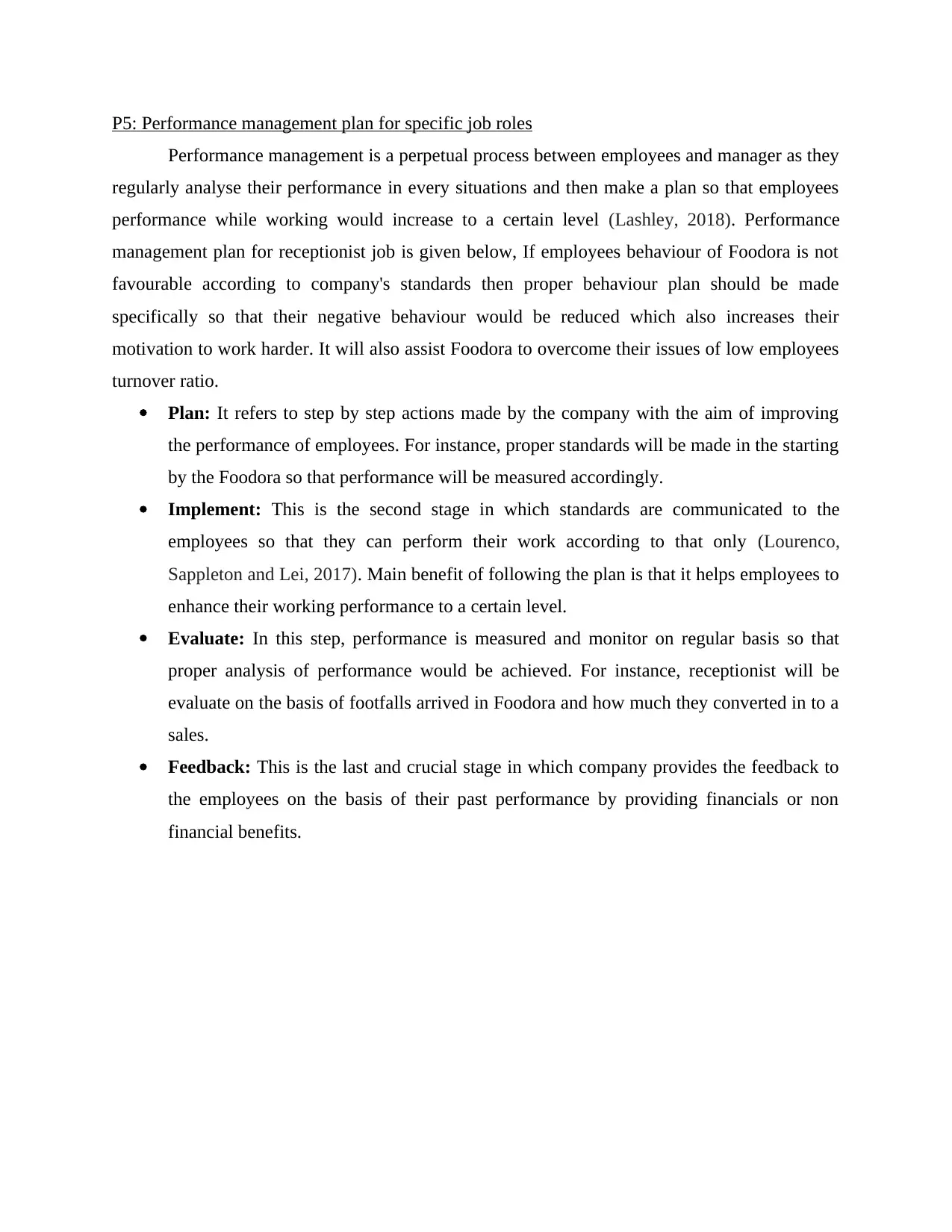
P5: Performance management plan for specific job roles
Performance management is a perpetual process between employees and manager as they
regularly analyse their performance in every situations and then make a plan so that employees
performance while working would increase to a certain level (Lashley, 2018). Performance
management plan for receptionist job is given below, If employees behaviour of Foodora is not
favourable according to company's standards then proper behaviour plan should be made
specifically so that their negative behaviour would be reduced which also increases their
motivation to work harder. It will also assist Foodora to overcome their issues of low employees
turnover ratio.
Plan: It refers to step by step actions made by the company with the aim of improving
the performance of employees. For instance, proper standards will be made in the starting
by the Foodora so that performance will be measured accordingly.
Implement: This is the second stage in which standards are communicated to the
employees so that they can perform their work according to that only (Lourenco,
Sappleton and Lei, 2017). Main benefit of following the plan is that it helps employees to
enhance their working performance to a certain level.
Evaluate: In this step, performance is measured and monitor on regular basis so that
proper analysis of performance would be achieved. For instance, receptionist will be
evaluate on the basis of footfalls arrived in Foodora and how much they converted in to a
sales.
Feedback: This is the last and crucial stage in which company provides the feedback to
the employees on the basis of their past performance by providing financials or non
financial benefits.
Performance management is a perpetual process between employees and manager as they
regularly analyse their performance in every situations and then make a plan so that employees
performance while working would increase to a certain level (Lashley, 2018). Performance
management plan for receptionist job is given below, If employees behaviour of Foodora is not
favourable according to company's standards then proper behaviour plan should be made
specifically so that their negative behaviour would be reduced which also increases their
motivation to work harder. It will also assist Foodora to overcome their issues of low employees
turnover ratio.
Plan: It refers to step by step actions made by the company with the aim of improving
the performance of employees. For instance, proper standards will be made in the starting
by the Foodora so that performance will be measured accordingly.
Implement: This is the second stage in which standards are communicated to the
employees so that they can perform their work according to that only (Lourenco,
Sappleton and Lei, 2017). Main benefit of following the plan is that it helps employees to
enhance their working performance to a certain level.
Evaluate: In this step, performance is measured and monitor on regular basis so that
proper analysis of performance would be achieved. For instance, receptionist will be
evaluate on the basis of footfalls arrived in Foodora and how much they converted in to a
sales.
Feedback: This is the last and crucial stage in which company provides the feedback to
the employees on the basis of their past performance by providing financials or non
financial benefits.
⊘ This is a preview!⊘
Do you want full access?
Subscribe today to unlock all pages.

Trusted by 1+ million students worldwide
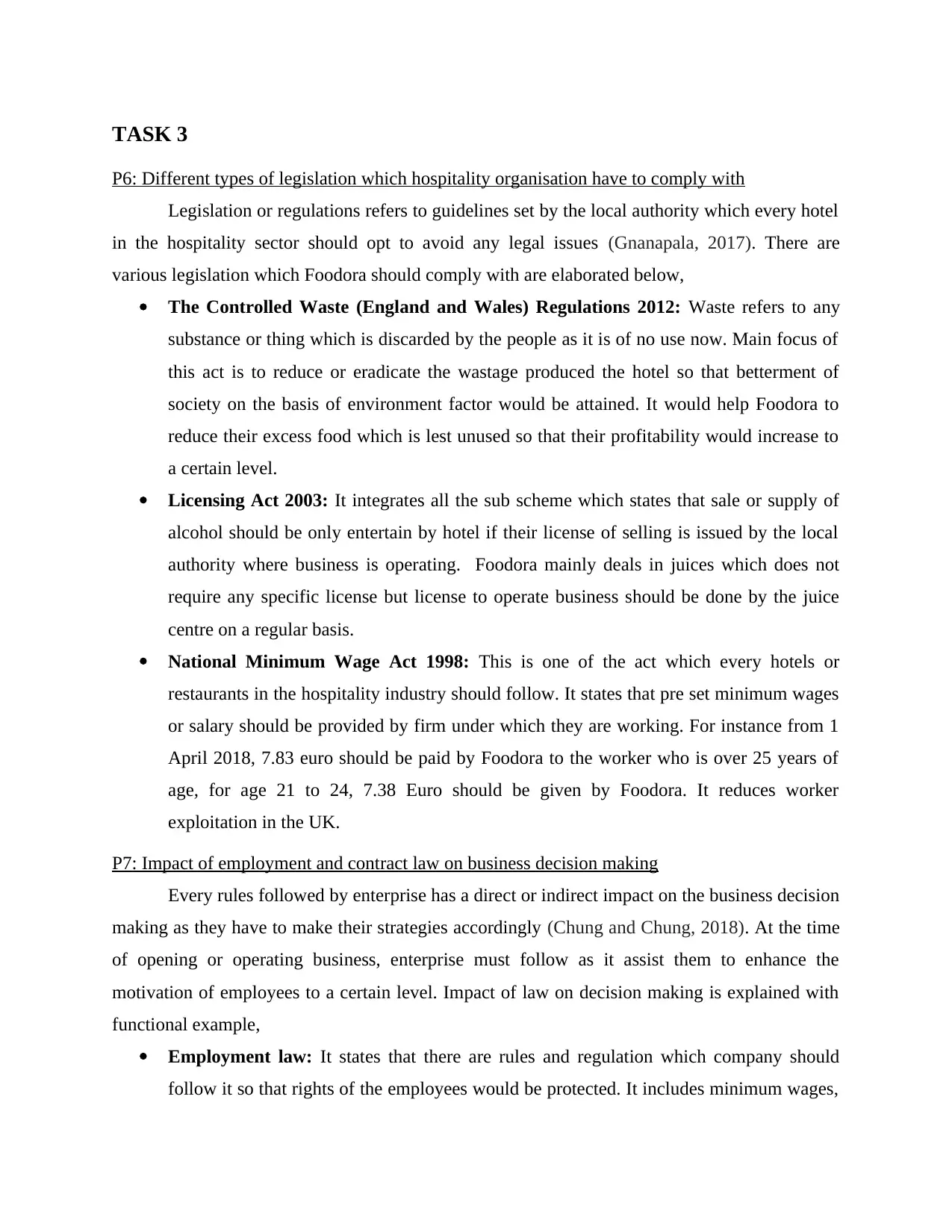
TASK 3
P6: Different types of legislation which hospitality organisation have to comply with
Legislation or regulations refers to guidelines set by the local authority which every hotel
in the hospitality sector should opt to avoid any legal issues (Gnanapala, 2017). There are
various legislation which Foodora should comply with are elaborated below,
The Controlled Waste (England and Wales) Regulations 2012: Waste refers to any
substance or thing which is discarded by the people as it is of no use now. Main focus of
this act is to reduce or eradicate the wastage produced the hotel so that betterment of
society on the basis of environment factor would be attained. It would help Foodora to
reduce their excess food which is lest unused so that their profitability would increase to
a certain level.
Licensing Act 2003: It integrates all the sub scheme which states that sale or supply of
alcohol should be only entertain by hotel if their license of selling is issued by the local
authority where business is operating. Foodora mainly deals in juices which does not
require any specific license but license to operate business should be done by the juice
centre on a regular basis.
National Minimum Wage Act 1998: This is one of the act which every hotels or
restaurants in the hospitality industry should follow. It states that pre set minimum wages
or salary should be provided by firm under which they are working. For instance from 1
April 2018, 7.83 euro should be paid by Foodora to the worker who is over 25 years of
age, for age 21 to 24, 7.38 Euro should be given by Foodora. It reduces worker
exploitation in the UK.
P7: Impact of employment and contract law on business decision making
Every rules followed by enterprise has a direct or indirect impact on the business decision
making as they have to make their strategies accordingly (Chung and Chung, 2018). At the time
of opening or operating business, enterprise must follow as it assist them to enhance the
motivation of employees to a certain level. Impact of law on decision making is explained with
functional example,
Employment law: It states that there are rules and regulation which company should
follow it so that rights of the employees would be protected. It includes minimum wages,
P6: Different types of legislation which hospitality organisation have to comply with
Legislation or regulations refers to guidelines set by the local authority which every hotel
in the hospitality sector should opt to avoid any legal issues (Gnanapala, 2017). There are
various legislation which Foodora should comply with are elaborated below,
The Controlled Waste (England and Wales) Regulations 2012: Waste refers to any
substance or thing which is discarded by the people as it is of no use now. Main focus of
this act is to reduce or eradicate the wastage produced the hotel so that betterment of
society on the basis of environment factor would be attained. It would help Foodora to
reduce their excess food which is lest unused so that their profitability would increase to
a certain level.
Licensing Act 2003: It integrates all the sub scheme which states that sale or supply of
alcohol should be only entertain by hotel if their license of selling is issued by the local
authority where business is operating. Foodora mainly deals in juices which does not
require any specific license but license to operate business should be done by the juice
centre on a regular basis.
National Minimum Wage Act 1998: This is one of the act which every hotels or
restaurants in the hospitality industry should follow. It states that pre set minimum wages
or salary should be provided by firm under which they are working. For instance from 1
April 2018, 7.83 euro should be paid by Foodora to the worker who is over 25 years of
age, for age 21 to 24, 7.38 Euro should be given by Foodora. It reduces worker
exploitation in the UK.
P7: Impact of employment and contract law on business decision making
Every rules followed by enterprise has a direct or indirect impact on the business decision
making as they have to make their strategies accordingly (Chung and Chung, 2018). At the time
of opening or operating business, enterprise must follow as it assist them to enhance the
motivation of employees to a certain level. Impact of law on decision making is explained with
functional example,
Employment law: It states that there are rules and regulation which company should
follow it so that rights of the employees would be protected. It includes minimum wages,
Paraphrase This Document
Need a fresh take? Get an instant paraphrase of this document with our AI Paraphraser
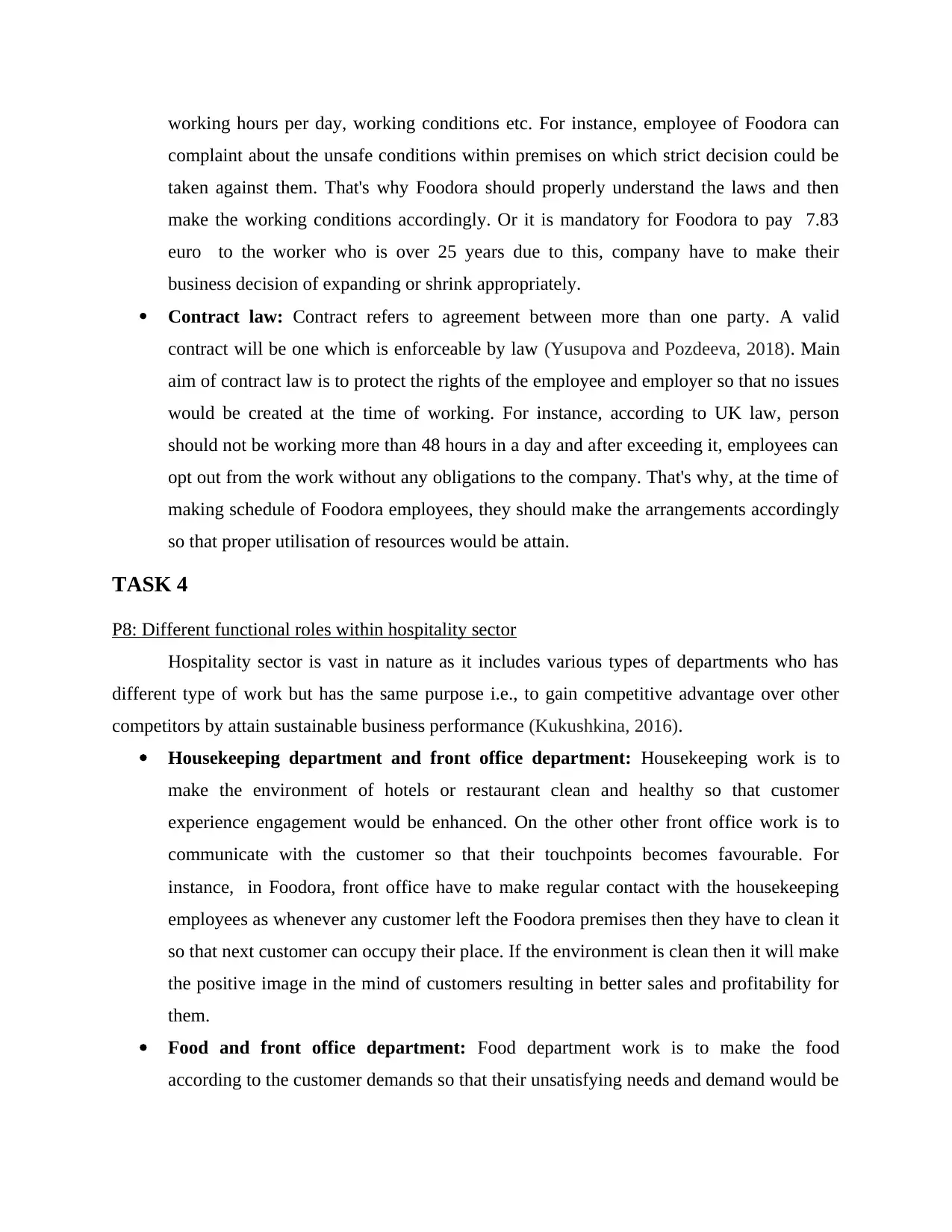
working hours per day, working conditions etc. For instance, employee of Foodora can
complaint about the unsafe conditions within premises on which strict decision could be
taken against them. That's why Foodora should properly understand the laws and then
make the working conditions accordingly. Or it is mandatory for Foodora to pay 7.83
euro to the worker who is over 25 years due to this, company have to make their
business decision of expanding or shrink appropriately.
Contract law: Contract refers to agreement between more than one party. A valid
contract will be one which is enforceable by law (Yusupova and Pozdeeva, 2018). Main
aim of contract law is to protect the rights of the employee and employer so that no issues
would be created at the time of working. For instance, according to UK law, person
should not be working more than 48 hours in a day and after exceeding it, employees can
opt out from the work without any obligations to the company. That's why, at the time of
making schedule of Foodora employees, they should make the arrangements accordingly
so that proper utilisation of resources would be attain.
TASK 4
P8: Different functional roles within hospitality sector
Hospitality sector is vast in nature as it includes various types of departments who has
different type of work but has the same purpose i.e., to gain competitive advantage over other
competitors by attain sustainable business performance (Kukushkina, 2016).
Housekeeping department and front office department: Housekeeping work is to
make the environment of hotels or restaurant clean and healthy so that customer
experience engagement would be enhanced. On the other other front office work is to
communicate with the customer so that their touchpoints becomes favourable. For
instance, in Foodora, front office have to make regular contact with the housekeeping
employees as whenever any customer left the Foodora premises then they have to clean it
so that next customer can occupy their place. If the environment is clean then it will make
the positive image in the mind of customers resulting in better sales and profitability for
them.
Food and front office department: Food department work is to make the food
according to the customer demands so that their unsatisfying needs and demand would be
complaint about the unsafe conditions within premises on which strict decision could be
taken against them. That's why Foodora should properly understand the laws and then
make the working conditions accordingly. Or it is mandatory for Foodora to pay 7.83
euro to the worker who is over 25 years due to this, company have to make their
business decision of expanding or shrink appropriately.
Contract law: Contract refers to agreement between more than one party. A valid
contract will be one which is enforceable by law (Yusupova and Pozdeeva, 2018). Main
aim of contract law is to protect the rights of the employee and employer so that no issues
would be created at the time of working. For instance, according to UK law, person
should not be working more than 48 hours in a day and after exceeding it, employees can
opt out from the work without any obligations to the company. That's why, at the time of
making schedule of Foodora employees, they should make the arrangements accordingly
so that proper utilisation of resources would be attain.
TASK 4
P8: Different functional roles within hospitality sector
Hospitality sector is vast in nature as it includes various types of departments who has
different type of work but has the same purpose i.e., to gain competitive advantage over other
competitors by attain sustainable business performance (Kukushkina, 2016).
Housekeeping department and front office department: Housekeeping work is to
make the environment of hotels or restaurant clean and healthy so that customer
experience engagement would be enhanced. On the other other front office work is to
communicate with the customer so that their touchpoints becomes favourable. For
instance, in Foodora, front office have to make regular contact with the housekeeping
employees as whenever any customer left the Foodora premises then they have to clean it
so that next customer can occupy their place. If the environment is clean then it will make
the positive image in the mind of customers resulting in better sales and profitability for
them.
Food and front office department: Food department work is to make the food
according to the customer demands so that their unsatisfying needs and demand would be
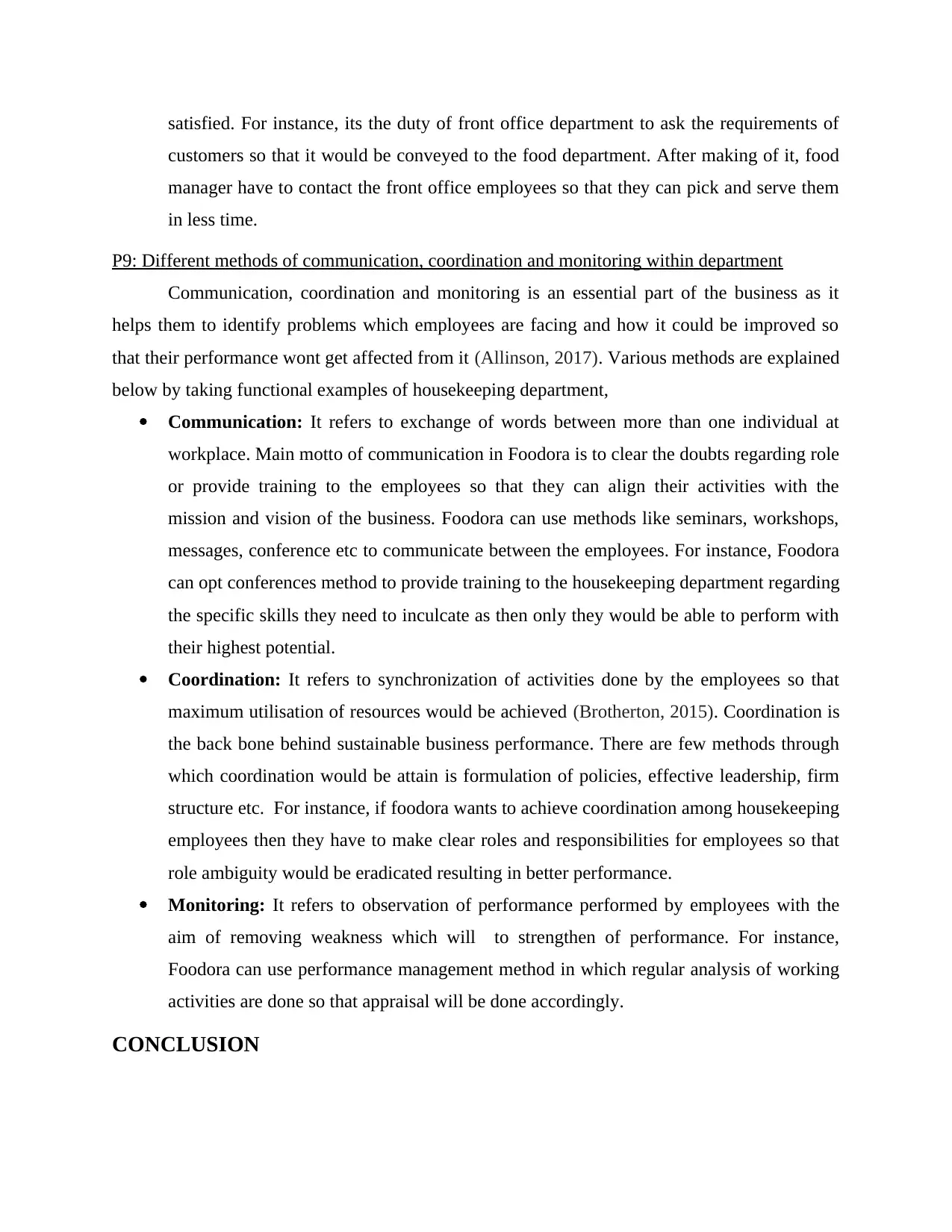
satisfied. For instance, its the duty of front office department to ask the requirements of
customers so that it would be conveyed to the food department. After making of it, food
manager have to contact the front office employees so that they can pick and serve them
in less time.
P9: Different methods of communication, coordination and monitoring within department
Communication, coordination and monitoring is an essential part of the business as it
helps them to identify problems which employees are facing and how it could be improved so
that their performance wont get affected from it (Allinson, 2017). Various methods are explained
below by taking functional examples of housekeeping department,
Communication: It refers to exchange of words between more than one individual at
workplace. Main motto of communication in Foodora is to clear the doubts regarding role
or provide training to the employees so that they can align their activities with the
mission and vision of the business. Foodora can use methods like seminars, workshops,
messages, conference etc to communicate between the employees. For instance, Foodora
can opt conferences method to provide training to the housekeeping department regarding
the specific skills they need to inculcate as then only they would be able to perform with
their highest potential.
Coordination: It refers to synchronization of activities done by the employees so that
maximum utilisation of resources would be achieved (Brotherton, 2015). Coordination is
the back bone behind sustainable business performance. There are few methods through
which coordination would be attain is formulation of policies, effective leadership, firm
structure etc. For instance, if foodora wants to achieve coordination among housekeeping
employees then they have to make clear roles and responsibilities for employees so that
role ambiguity would be eradicated resulting in better performance.
Monitoring: It refers to observation of performance performed by employees with the
aim of removing weakness which will to strengthen of performance. For instance,
Foodora can use performance management method in which regular analysis of working
activities are done so that appraisal will be done accordingly.
CONCLUSION
customers so that it would be conveyed to the food department. After making of it, food
manager have to contact the front office employees so that they can pick and serve them
in less time.
P9: Different methods of communication, coordination and monitoring within department
Communication, coordination and monitoring is an essential part of the business as it
helps them to identify problems which employees are facing and how it could be improved so
that their performance wont get affected from it (Allinson, 2017). Various methods are explained
below by taking functional examples of housekeeping department,
Communication: It refers to exchange of words between more than one individual at
workplace. Main motto of communication in Foodora is to clear the doubts regarding role
or provide training to the employees so that they can align their activities with the
mission and vision of the business. Foodora can use methods like seminars, workshops,
messages, conference etc to communicate between the employees. For instance, Foodora
can opt conferences method to provide training to the housekeeping department regarding
the specific skills they need to inculcate as then only they would be able to perform with
their highest potential.
Coordination: It refers to synchronization of activities done by the employees so that
maximum utilisation of resources would be achieved (Brotherton, 2015). Coordination is
the back bone behind sustainable business performance. There are few methods through
which coordination would be attain is formulation of policies, effective leadership, firm
structure etc. For instance, if foodora wants to achieve coordination among housekeeping
employees then they have to make clear roles and responsibilities for employees so that
role ambiguity would be eradicated resulting in better performance.
Monitoring: It refers to observation of performance performed by employees with the
aim of removing weakness which will to strengthen of performance. For instance,
Foodora can use performance management method in which regular analysis of working
activities are done so that appraisal will be done accordingly.
CONCLUSION
⊘ This is a preview!⊘
Do you want full access?
Subscribe today to unlock all pages.

Trusted by 1+ million students worldwide
1 out of 14
Related Documents
Your All-in-One AI-Powered Toolkit for Academic Success.
+13062052269
info@desklib.com
Available 24*7 on WhatsApp / Email
![[object Object]](/_next/static/media/star-bottom.7253800d.svg)
Unlock your academic potential
Copyright © 2020–2026 A2Z Services. All Rights Reserved. Developed and managed by ZUCOL.




